|
By Courtney McAtee 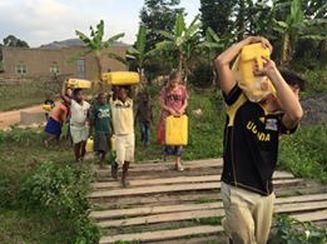 We started the day by levelling the ground beneath the swings, it was quite hard because we had to level it on a slant. Also it was a warm day so we had to keep hydrated. So that the swing area did not turn into a mud pit in the rainy season, we were building a large 4m by 4m sandpit to surround the swing. We managed to level the ground, build edges so the sand wouldn't spill out and we collected water so the soil underneath would be compact. For the edge of the sandpit we needed to collect large pieces of timber, each well over 3m long and quite thick. We carried the wood down the hill on our shoulders and then sawed it to the right size. It was a long day of physical labour, perhaps our longest so far. Some days we have not managed to see much difference in the land despite hours of work, which can be a little demoralising, but today was quite satisfying as we could clearly see a huge difference with the land levelled and the new large sandbox surrounding the swings. It felt good. After finishing all that, we wanted the soil to stay in place so we had to collect some water to sprinkle onto the dusty soil before stamping it firmly down. Collecting water was the hardest part of my day. When I arrived at the water pipe loads of people were waiting to fill their jerry cans at the local standpipe, and seeing the long line it made me realise that this is a daily reality for so many people. After they filled it, they placed it on their head and walked off. This all looked simple until I tried it! I filled my 20 litre can and then shoved half a plantain (a hard, unripe savoury banana) into the top to stop the water spilling out. Most people would carry it on their heads, so I tried this first but it put a lot of strain on my neck and head so that method didn't last long. I then decided to try putting it on my shoulder, like how we had carried the wood earlier. I found that hard to balance as the water sloshed around so much inside the can that it was very destabilising and would just slip off. In the end I just carried it with my hands underneath the bottom of the can. 20 litres of water is about 20kg, so these cans are heavy! If that wasn't hard enough we had to cross over streams, jump over gaps, climb up steep hills and go through people's backgardens and fields to carry it back home. From the water pipe to The Peace Centre is probably around a 1 kilometre walk, so it is safe to say that by the end I was exhausted. I can't imagine how people can do this every day all day, when all I have to do is turn on a tap to get water. Later on in the evening there was a talk to the Peace Centre children about human rights. Some of them knew they had a right to clean water, education and healthiness, but some of them seemed surprised to hear about it. Most of them would have came from backgrounds where they wouldn't go to school or have enough food per day. I see a lot of children around Bukinda who don't go to school but instead spend their days looking after cows and goats, or collecting water for their family. The Peace Centre children are lucky they now have access to clean water and lots of food every day, as well as an education, and I got the impression that they felt that tonight. The last thing we all did today was to help the children to write to their sponsor families. I was with one of the youngest kids in TPC and he didn't fully understand the role of the sponsor yet, except that they are a person/family living far away who support him and want him to do well. He got his first letter from his sponsor today and he started to understand more about it. He calls his sponsor Tata (dad). Four children got their first communications from their sponsors tonight and, especially for the ones a little older, it was pretty amazing witnessing their reactions to receiving this. The majority clearly do understand and appreciate the role of the sponsor: that of a long distance adoptive parent/family. Some of these children were just bubbling with excitement, and even crying tears of happiness when receiving these emails. If any sponsors are reading this blog, know how much of an impact your communications mean to these children. We all got to see the extreme joy and massive smiles first hand tonight and it was very special. Thank you for supporting them!
0 Comments
By Anthony Reich I'll be honest, I'm writing this blog in floods of tears. They've started flowing and they just won't stop. I'm sitting on a hill on an island in Lake Bunyonyi, South-West Uganda, watching The Peace Centre children play, and I'm crying, and I'm not even sure I can verbalise why. I guess I'm crying at the injustice of some children being cursed at birth by being born to parents who have AIDS; I'm crying that some of these children were simply abandoned, their parents walked out of the door and went away never to return; I'm crying at lost childhoods and innocence robbed; I'm crying at years of poverty and starvation; and I'm crying that these children have never played in a playground before. Playgrounds that are in every park and garden and street corner in England and America and China (Shanghai at least) and so many other places in the world and seem like such a commonplace thing... But here I am watching children, some as old as eighteen and not even children any more, playing on a simple swing and slide for the very first time in their lives. Is it fair? It can't be. But I guess mixed up in these tears of anger, sadness, pain and confusion are also tears of joy. Joy that for just these few children, these twenty-three kids, that life of poverty and abandonment is now over. The trajectory of their lives has been forever altered and they now know of love and tenderness; they now do not have to worry about where their next meal will come from, or even if it will come at all; they now have a future filled with education; and they have a home, a new family and a sense of belonging. I'm crying as I can hear cries of laughter and happiness, and as our Dulwich students who have been blessed with a different start to life, are playing with these Ugandan kids, and for just a brief moment, backgrounds, nationalities, past lives and even wealth do not matter at all. They are all just children and young people playing, laughing and having fun as one. So I think I am also crying tears of gratitude to everyone who has helped make this dream come true. This vision of a home for orphans in Bukinda was a seed planted way back in 2001, the dreams of idealistic young adults who made a pledge in the middle of the night with their adopted African parents, Peace and Golden, that one day it would happen. It took a great deal longer than we anticipated through false starts and disappointments, but as of 2nd Feb 2015, The Peace Centre opened its doors to its first 19 children, which has now grown to 23, and this would never have become possible without the help of countless people who have helped turn a dream into a reality. Some of these people have given by coming on our school trip to Uganda this year and last, others have volunteered to sponsor orphans in TPC, others have given anonymously, some have given their time or advice, others - such as the workers in the orphanage - have given their vocations and their lives to caring for these children, and others still have given prayers and emotional support. To you all, thank you. Those two simple words just are not enough, but they are all I can give to you. That, and the picture and sounds of smiles and laughter and youth reborn on a hill, besides a lake in South-West Uganda.
The tears are subsiding now. by Andy Clapperton 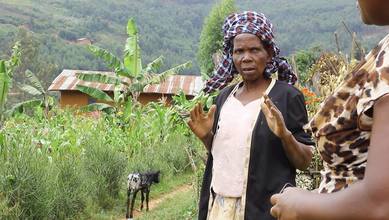 Having spent two weeks in the wonderfully joyful and bustling environment that Peace, Golden and all the other staff maintain here at The Peace Centre, joking with children who seem to be constantly smiling, and who have amazed me with their graciousness, at times I have almost forgotten where these kids have come from. But last Thursday served as a sobering reminder. I went to do a couple of home visitations to learn more about two children whose guardians had brought them along to the centre in the hope that they might gain a place here. The first was Christopher, a young lad who is three years behind in primary school. Both his parents died about two years ago, and he has lost all his brothers and sisters to HIV/AIDS. Despite the tragic losses, it transpired that the boy was provided for by loving grandparents, who sent him to a private school rather than the cheaper government options. We strongly believe that children should not be taken away from a caring family environment, even an extremely poor one, and as such it is likely that Christopher will remain where he is. The second visitation of the morning was rather different, however. With no name or address, we travelled up into the mountains towards a small village looking for a man known simply as the ‘crazy alcoholic’. Everyone knew who we were asking after, such was his notoriety, and before long we surely came across him on the roadside, raging drunk. En route to his house we asked about his daughters. We already knew that Francesca, the older of the two, was twenty years of age as she had brought her younger sister Hannah to The Peace Centre in the hope that we would take her in and they could both escape the beatings of their drunken father. The old man was not very forthcoming when we inquired about his daughters. Eventually when we asked him what his youngest daughter’s name was, he said he couldn’t remember. I don’t have the best of memories, but I was absolutely flabbergasted – not to be able to recall the name of his daughter of eight years was beyond imaginable. When we arrived neither of the girls was at home. We spoke to a neighbour and it became clear they regularly have to flee the house and she sometimes gives them a little food and a floor to sleep on. Francesca only completed primary school before her mum died, and since then has dropped out and works the fields to provide food and clothes for her little sister. There was also a suggestion that she ‘is forced to do things she does not like’, in other words she has resorted to prostitution as a last recourse in the fight for survival. There was a lock on her bedroom door when we visited the house, which we later discovered was there to prevent her father from pocketing her earnings and blowing them all on cheap firewater. Talking to the girls when they returned to The Peace Centre the following morning was upsetting, with both of them shedding tears as they elaborated on their mother’s sudden death and their father’s descent into alcoholism. Their reticence belied a resourcefulness and courage brought about through sheer desperation. Francesca was anxious to set her younger sister free from the chains of a life of being neglected and abused. In fact it was only in order to protect Hannah that she herself had not already left home. Indeed, one of Hannah’s teachers had commented that he “would be happy to see that repulsive man dead” so that, as a total orphan, Hannah could be taken into care elsewhere. Having a father was worse, in her case, than not having one. It shook me. Most of all it shook me when I was reminded that little Collins, Alex or Lucky, already enrolled in The Peace Centre, enjoying soft beds, electricity, running water, regular meals, and, most importantly, the loving family environment, came from similarly harrowing backgrounds. I had read all of their stories before. I had edited them and posted them on our website, even. But to see these little bundles of joy each day being playful, being cheeky, just being children, you would not know what they have been through, and that is testament to the marvellous staff at The Peace Centre. Though saddening, it was important for me to get a glimpse into Hannah and Francesca’s story – it reminded me that there is a way out. We have in theory accepted Hannah for a place in The Peace Centre, subject to further checks and the necessary paperwork for custody. When Gloria brought her back from her HIV/AIDS test at the Health Centre, Peace handed me the carefully folded doctor’s note without saying a word. My heart missed a beat, as the sombre expression on her face suggested it was going to be positive. I had to read it about three times to make sure before allowing myself to breathe a massive sigh of relief – Hannah is HIV negative, and hopefully has a long and successful life ahead of her. By Megan Hasenfratz 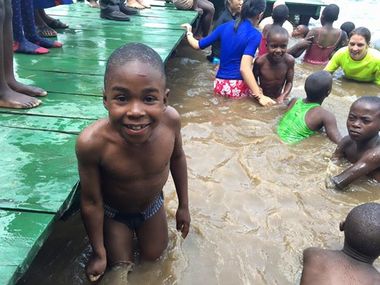 My eyelids started to flutter as my body gently woke to the sounds of the island's humming. The morning sun gave off a faint glow through the windows, blending perfectly with the light chirping of the pelicans who flapped around our wooden banda on the morning of this weekend retreat. It was the perfect time and place to flood my journal with the many memories I've made so far. Shortly afterwards, I went for a light jog around the island, taking momentos and simply enjoying the fresh air. The cool wind which brushed past my face reminded me of the cool night air I felt back in the village whilst stargazing, and the overwhelming delight I have experienced so far this trip. It is so amazing how different environments can evoke the same feelings. In that moment I realised it does not matter where you are in the world, you will always be able to remember the memories you created and the bonds you've made with others. On my jog I passed a couple of grazing zebra which were truly beautiful to see. My running and contemplating was soon followed by a refreshing shower and a big breakfast. Later on in the day, the Uganda crew hopped into a boat and we sped our way across to Island Bushara. A palpable sense of anticipation grew knowing that we were about to meet the whole Peace Centre crew, who had all arrived from Bukinda that morning. We had arranged for TPC children, staff, volunteers and board members to all join us for the day at the lakeside for a swim and a special community lunch. For all of these children, and many of the adults, this was their first ever time at this beautiful lake, despite it being so close to Bukinda. It is always exciting seeing people experience something special and beautiful for the first time, and frankly, I couldn't wait! We all met amidst singing at the boat dock and then made our way to the swimming area. Clothes were being tossed in all directions; the Dulwich kids were eager to get into the water. However, the Peace Centre children lingered around the edge of the jetty, unsure of what to do. Encouraging words from Peace and other bystanders gave the children a feeling of comfort and they slowly entered the water. Still apprehensive about swimming for the first time, the children clung tightly to the edge of the dock or tightly to us as we held them in the water. Regardless of their inablity to swim, it did not stop them from learning and enjoying themselves splashing about. There are no words that could describe the amount of joy that flowed through my body after seeing the humongous smiles spread across the children's faces. Can you remember the odd sensation of swimming for the first time? That wonder, mixed with fear and intrepidation, at the sudden realisation that you cannot stand on this strange unworldly liquid...? That was what we were seeing first hand and it was truly special to witness. Suddenly it was four o'clock. Our island adventure that had consisted of swimming, jumping off ropes, dining on delicious food, and playing with the Peace Centre kids was drawing to a close. I had had so much fun playing with TPC children on a swing and a slide, all of whom had never played in a simple playground before! Going down the slide cuddling some of the little kids as they experienced that mini adrenaline rush for the first time was a joy and a privilege! So at four o'clock the time to leave the island had come and all sixty five of us boarded two wooden boats to make the journey back to mainland. The boat journey was magical, as it was spent singing and laughing and sharing: this is community, I thought. But amidst all the excitement, I stopped for a moment and looked around. It seemed the vibrations from the children's voices caused the waves to ripple more vigorously. More excitement bubbled up as the children sang louder and louder, trying to overtake the other boat. (Check out the video of the boat journey we have posted on our facebook page to get a glimpse of what I am trying to describe!) The bonds I have made here ensured a new home. Not a second home, but another home. An entirely different kind of home to the one I have already. But a home that I can call mine. A home where I feel I belong. Where I can love and am loved. I am overcome by everything that has happened with these children. They have undergone horrible situations and... and... and yet they are still able to open up and bond with every single one of us, and love us. They are loving us just as much as we are loving them. What an honour that is. Looking to the future, I may not remember the exact words they say, or the precise experiences we share, but I will always remember this joy and this overwhelming love they make me feel. By Isabel Joseph This morning, I got to build library. I am extremely fond of reading and much prefer it to watching TV, so I was very happy to see that the orphans were being given the opportunity to read. We had brought out many books with us, both this year and last, and Megan and I were given the task of categorising them so that the children can easily find a level appropriate book when choosing one to read. We had got two nice wooden bookcases made, and whilst we were busy with this task, a couple of others in the team were sanding down and varnishing the eventual home for these books.
As I was going through the books I thought back to the first night of reading with the kids. I was reading with little Joan, who can barely read. Without The Peace Centre these orphans would never have even dreamed of being able to have so many books in their own home, and yet here I was sorting through a bunch. A lot of the books I recognised as ones I had enjoyed when I was younger and it warmed my heart to know that these kids also have the opportunity to enjoy the same books that have kept me company late at night. As I was flipping through the books covers I noticed some messages, for example from a grandmother to a grandchild. It is so amazing to see books that are not only being passed on from generation to generation but also from country to country. After lunch I decided to do some more weaving with Megan. I have been weaving in the afternoon for the past four days. It is quite relaxing as we are able to weave and chat with the kids mingling around us trying their hand at it, however, it can also get quite repetitive. Not something I think I'd enjoy to do for a living. Today was the day I finished my bag, I had to finish sewing the zipper and the sling. I felt a feeling of great achievement when the bag was done as it had taken so much effort and time. I cannot even begin to imagine how people do this for a lifetime. A local man had been coming to help us make the bags and I got to thinking about how much he earns per bag, and it's not very much at all. When you consider that just these small Palm tree woven purses take a few hours each to make, you have to ask how much this makes his time worth. Again, not very much at all. All that time and effort and creativity to earn so little. It makes me sad to think that people have many skills that are not appreciated simply because they are living in a different environment and do not have the opportunities to better themselves. In order to better understand the predicament that the children here find themselves in, and so that we can continue to build The Peace Centre to suit their needs best, for our night activity today we helped the kids answer some questions about their lives prior and post joining TPC. I was helping Fortunate, a 13 year old girl, answer the questions. The first question was about what their lives were like before they came to live here. It was emotional when Fortunate was trying to answer the question, as she was getting quite sad and upset as she thought back to those days. She wrote, "Before I came to The Peace Centre I had to wake up at 5am and go to bed at 11pm and do heavy work all the time in between. Every day I will be digging in the fields. Now I have enough time to sleep. That is, we now sleep at 10 and wake at 5:30. Before I came to The Peace Centre I was suffering and I saw a future of suffering. Now I want to be a Doctor." Fortunate's own words say it all. How exciting it is to be with these kids and to see the difference TPC is making in their lives. One other thing that Fortunate wrote was that one of the best things about The Peace Centre was that it allowed for leisure time, which meant she could play, sing and read. It bought a smile to my face to know how much this small, humble library we have built, will be treasured by children thousands of miles from where these books were first treasured by others; and that they'll bring laughter and joy to where it is needed. By Priyanka Menon 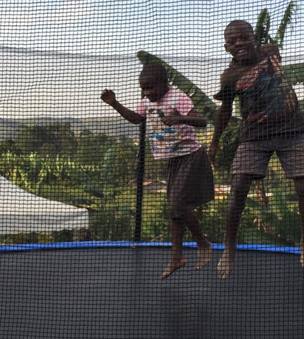 Today was a day of hard work but also accomplishments. We started the day with a filling breakfast as usual. Throughout the trip we have all tried to begin the morning with a perfect hard boiled egg, meaning when peeling the shell there should be no scratches or dents in the egg, or egg stuck on to the shell, resulting in a very smooth and well, perfect egg. A perfect egg at breakfast is a good omen and means we will have a great day! Today was someone's lucky day, Costa (Andrea) peeled the perfect egg, so I guess it was the universe wishing him a Happy Birthday! The hardest and happiest moment of the day was constructing the trampoline - all 75 kg of it that we had transported all the way from Shanghai - but it turned out to be much bigger than I imagined. There were quite a few problems that occurred when building it. This included missing screws, missing holes in the trampoline legs, one side of the ground being higher than the other, and finally the whole thing warping! Argh! The whole process started with Megan, Isabel and I having to level out the ground and this meant using sticks with wooden panels on the bottom and hitting the ground to make it as flat as possible as it was not even. A tough job in the morning heat. Assembling the trampoline was initially easy, until we flipped the page of the manual and it told us to insert the screws in the small holes that were around the base of the trampoline. Two problems: 1. There were no holes whatsoever. 2. There were no screws. We decided we would hurdle that obstacle later and construct it anyway. This was fine, until the whole trampoline warped and bent in on itself after we had attached the springs. Not good. A short break and a quick phone call later and the local Metal Worker arrived and welded it all together. Take that trampoline! We also asked him to make ten huge 2 foot long 'tent pegs' so that we could securely fasten the legs deep into the ground for added stability. We finally finished the job at 5pm just as some of the older children were returning from school. It was so rewarding just seeing the children's bright and happy faces as looked upon this bouncy, springy contraption of happiness. It is no exaggeration to say they had never seen one before, and the wonder in their eyes as they saw their friends bounce amidst so much laughter was super special. And then when they had their first turn on it! I have never seen such ecstasy on faces before... all accompanied with laughter and giggles and pure joy. It made me feel so lucky for what I have. Just to think that it was the first time any of the children and even the adults had never been on a trampoline or swing before, something so simple, something that we find very usual, was so new to them and made them so happy and excited. It just made me realise how many things, in a day, that we take for granted. This could be something so small as having a varied wardrobe of different clothes, a warm bed or AC in our rooms, or just having the luxury of showering with hot water, and again having a swingset in our back yard. Or what about being transported in a car and knowing we have access to excellent health care? And that is before we even think about 'bigger' things like international travel and seeing the world. I know that from now on whenever I feel that something in my life is not fair or that I want something I can't have, I will just think of all these children. I hope I never lose this sense of perspective. For me another amazing part of the day was cutting potatoes in small strips to make chips, homemade chips that turned out to be delicious. It is quite amazing to think that the women start their day right after we have had breakfast for lunch and start cooking again when we have ended lunch to be ready in time for dinner. They need that much time to cook dinner as there is a lot needed especially since the children have about double our normal serving, and second of all because there cooking resources are quite low so they have to start the fire as they don't have any gas to cook anything, it all done with wood and charcoal. Every day some of our Dulwich team help the ladies (and Henry the cook) in the kitchen to prepare for meals and to clean up the dishes afterwards. We all enjoy the cooking, but no-one enjoys the dishwashing in cold water! Our task today was to cut eggplants, potatoes and to shell peas. We then helped Cynthia with making the chapatis and we all decided that on Friday night, our last night here, we will make as many chapatis as possible as they are amazing! Aisha, Courtney, Gracy, Amelia and Sophia decided to come and join us... as I said, everyone loves to help in the kitchen. Maybe because they feel that they have to do 'quality control' tests to make sure the chips and chapatis are tasty enough for general consumption! To end a hot day we all looked at the sky as the sun set for the night. We looked at it, not in the way where we just notice the fact that the sky is beautiful mix of blue, purple and pink, but in a way where we realised that this huge, vast thing connects us all, wherever we are from and wherever we are in the world. I think that will comfort me when I have to leave here at the end of the week. I guess the egg this morning was right, we did have a perfect day. By Riel Beaumont-Boulanger On Friday morning we set about flattening the ground for the playground that we had planned to build for the children. We were working in the shadow of the building that at the end of last year's trip was only a frame of what The Peace Centre is now. Providing love, care and a home for twenty kids. It is strange, yet satisfying, to see how this is now a fully fledged home and no longer rusty red bricks piled up waiting to be cemented. Putting in a playground seemed incomprehensible at the end of last year's project.
This morning, before heading off for a night's reflection at a nearby island Eco Resort, our task was to install the swing for the playground. We had to dig four holes three feet deep - not an easy task! - and then carry sand, water, cement and small rocks to make a solid base for the swing. We don't want kids flying off into orbit because the base isn't properly secured! It was exciting to see the playground actually starting to look like a playground. A place that I am sure would be frequented by the TPC children and most likely other children from the village for years to come. Putting in a playground is something that is new to the village. Now instead of only playing with a football in the alleys around the village they will have a place to play and laugh and enjoy themselves. At around 9am that morning an old man walked down the hill onto the lawn in front of Peace and Golden's house. With him he brought a small girl who we later learned was called Angela. She had been brought by her elderly guardian to be enrolled in TPC. After he had done the entrance interview with Peace, we discovered that he, a shoemaker who works in the locals markets, had found about her wrapped up in a blanket in the market when she was a baby. After taking care of her for nearly ten years he was aware that he was ageing and would not be able to take care of her for ever. It was already proving tough for him to pay her school fees and she was already three or four years behind in school, a ten year old in Primary 2 amongst six year olds, instead of with her peers in Primary 6. (This is commonplace here though... when we visited the Primary School last week we found an eighteen year old in Prinary 7!) He had heard about TPC and seen the work we were doing with orphans and wanted to see if little Angela was eligible as he did not want to see her fall behind any more in school. There will be a home inspection next week and the old shoemakers credentials checked prior to a final decision being made. With the swing up, we boarded a bus and drove through Kabale town to get to the dock to board a wooden boat to cross Lake Bunyonyi to get to Govenor's Island and the Eco Resort. The change of scenery from the village was quite nice. The calm, cool atmosphere of the lake was a refreshing change from busy life in the village. The lake looked amazing at sunset with a nice breeze coming off of it. I went swimming with Nicky, Aisha and Courtney, and Mr Reich got some good pictures of us jumping into the lake. We caught some good air time! That evening we all sat around a lovely log fire and shared some reflections with the group about how this trip has impacted us so far and what we has surprised us the most. Many of us talked about the warmth of the children, the speed at which they are learning English and their innate joy. Others shared about the things they take for granted back home when confronted with what little many in the world get by on. It was a good time of sharing. Being in completely unmodified nature like this is something that is rare coming from Shanghai which is busy, polluted and loud, and it was refreshing to be here. It has been a really great week in Uganda; the travelling, the building, the developing relationships, the playing with the kids and the relaxation time have all been super enjoyable. By Sanraj Mittal 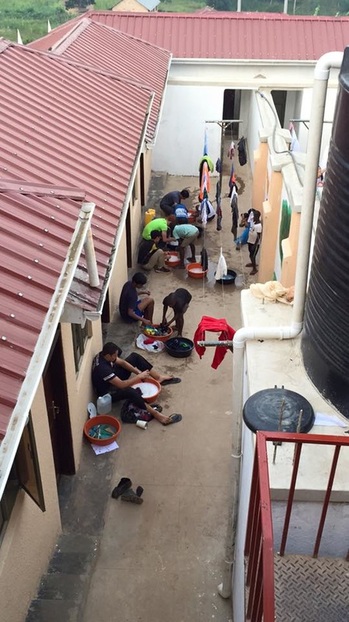 In the past 24 hours I have started to become more aware of several cultural differences between the one in which I live and the one I have become a part of. Bed time last night proved to be particularly eventful. My roommate and I were in the process of winding down when we noticed what, at the time, seemed like the biggest bug we had ever seen in our lives careering around the bedroom and seemingly relishing dive-bombing us in a frenzy of calculated attacks! What proceeded was a combination of shoe throwing, shouting for help, and hiding under the blankets. After about 15 minutes of cowering in fear, Golden wandered past the door and heard the commotion. "What is going on here?" he enquires. He walked in, saw the problem, sauntered towards our malicious attacker and simply grabbed the bug with his bare hands, just plucking it directly out of the air! And of course, being Golden, he was laughing all the while. "It is harmless," he chuckled as he left the room, and turned and added with a cheeky smile, "Do you cowards need any more assistance? I thought you were men, not boys!" I cannot imagine anyone I know dealing with such a mammoth sized bug so nonchalantly. We tend to make much ado about nothing, and that has definitely become clear here in Bukinda. Today happened to be laundry day. After last year's trip I thought I would have this laundry thing down pat. Sadly, I was mistaken. Washing your clothes here involved scrubbing, rinsing, scrubbing, rinsing, scrubbing... well you get the idea... our extremely dusty clothes in cold water, all whilst trying not to waste precious water. The TPC children laughed at my every attempt to wash my shirt. Whenever I thought the shirt or the sock in my hands was clean, I was greeted by a chorus of "no!" from the kids themselves, again amidst fits of laughter. This is one of many of their chores, which include washing the dishes, cleaning the latrines, sweeping the floors of the orphanage, looking after the younger children and sometimes even digging in the field to help cultivate crops for dinner. These are things that none of us ever do. We all have our washing machines and dishwashers and on top of that, many of us have Ayis that even use the machines for us. We don't even have to turn the switch on! When I return to Shanghai I very much doubt I will be doing any of these chores on my own and by hand, but knowing that the children here have to do this on a daily basis will at least make sure that I don't take a clean plate, a fresh pair of trousers and a clean toilet for granted. A final major difference between western culture and life in Bukinda that I observed today is the alcohol culture. Back home, it is normal for adults, or even teens, to have a glass of wine with dinner or a drink or two on a night out. People are able to drink to relax, and drink in moderation. In Uganda, it seems as though you either stay sober or you are a drunkard. There is no in-between. This was brought to our attention in our cultural training sessions before we came to Bukinda, but even knowing it doesn't quite prepare you for seeing it first hand. Today while working in the middle of the day, a drunk man noticed the muzungus (white people/foreigners) doing done manual labour and in his excitement, decided to serenade us for half an hour. No one took him seriously. In Shanghai, it is rare to see someone intoxicated in the middle of the day, but it is normal to see people having the odd drink. It is almost like the drunkards here do not take themselves seriously. Their predilection to alcohol is what defines them in the way exceptional kindness or expertise at a particular skill may define anyone else. There are several differences between life in Bukinda and life in Shanghai. It is clear in the little differences in daily life like dealing with a "monstrous" bug and in the noticeable differences in lifestyle. I'm enjoying having my eyes opened on a daily basis and having various preconceived notions on life challenged. By Michael Cheong Today we spent loads of time with the local children, first at the primary school, and then at TPC. At around 11am, after a couple of hours of painting and digging, we set off for the primary school. The school consists of two long buildings with about five classrooms in each, all equipped very minimally with just old wooden desks and chairs. The floors are dust and there is no electricity. There are up to 70 students in some of the classes. They were elated at the knowledge of our arrival, and as they saw us walking through the compound hundreds of little faces crammed around the shutters at the windows and peered out hoping for a glimpse of the visitors. Visitors are widely respected in Uganda and much is done to accommodate them and make them feel welcome. It is almost ritualistic. I cannot help but wonder if we treat all of our visitors, especially people we don't know, with such respect and care. The school's campus was dotted with rusting metal signs that are aimed to ensure the kids' safety. Most of them carried messages of abstinence or of warnings to stay in school. The ones that I remember read, "AIDS is for Life" "There is No Safe Sex" "AIDS is Slow But Sure" "Don't Accept Gifts For Sex" And simply, "Stay in School". It was very strange to see these weighty signs in a playground, where kids run and chase and laugh. They all reminded me of how different our lives are. It was very sobering.
But there wasn't really time for silent reflection as the bell was rung and the kids all ran out of their classrooms - some things don't change in schools around the world! They assembled before us in a parade of happy faces and we each introduced ourselves to the 450 or so kids, before Alex and Andrea, two of our school leaders from Year 12 DCS, shared a short message. Alex used the analogy of being part of a sport's team to illustrate how we must rely on our teachers, guardians, siblings and friends to go through life. He wanted to remind them that they are never alone and that there are always people who care. Andrea used a practical demonstration of her rubix cube (at which she is a master!) to illustrate the importance of persistence and never giving up in school. Many students drop out of school here, and have very limited futures as a result, so this too was an important message. We then sang songs before breaking up into smaller groups with the children. I was paired with Mao and Megan and we had about 60 or 70 seven or eight year olds to look after. With no real resources it was exhausting! I take my hat off to the teachers there that do it all day, every day! After a tiresome afternoon of hoeing, shovelling and removing bush roots for a small playground, we settled down for an evening activity of reading books with TPC children. We had brought a lot of books with us, so it was great to be able to use them with the kids. There was a power cut and we had to use torchlights and paraffin lamps to illuminate the words on the pages. Some of the children found it difficult to read. The child I was paired up with, Zion, did not know how to pronounce a number of words. I personally do not enjoy reading, but to see many happy faces illuminated by a faint glow of light reading books, I felt that we take so many things for granted, and sometimes, all we need is a bit of light and some peace to realise that we are all human. By Sophia Foerst Africa is very different to what I expected. First of all, in South-West Uganda at least, there is no shortage of food. In fact I'm very happy about the food; there is lots of it and it's delicious. Every meal has lots of variety, even if it is quite carb based. For lunch and dinner we have six or seven of the following dishes: potatoes (done in a many different ways - including chips!), plantain, bean stew, rice, green beans, peas, cabbage, cauliflower, groundnut sauce, tomato stew, chapatti, goat, chicken, lamb or beef stew, posho (maize meal), pumpkin, swede and carrots, and this is always followed by lots of fresh fruit. The pineapple especially is so fresh, sweet and juicy, it's delicious. Mr Reich explained to me that the locals don't always eat with such a wide spread on the table, and that they pull out all the stops for visitors, but that there isn't really a shortage of food in this fertile part of Uganda. And this leads nicely on to the second thing that surprised me, and that is how green and pretty it is here. It is a long way from the dry, dusty, arid stereotypical Africa that you see on the news. There are so many shades of green all around, with crops growing on many of the hills. It is very beautiful and a long way from what I'd imagined. Finally, I have been surprised at just how friendly everyone is. I'm not sure where I got the idea from, but I had for some reason imagined that the people here would be different, and a lot less open. I'm so glad I was wrong about this as the welcome we have received has been very special; everyone is so happy and warm and it's really lovely.
Today we needed some paint, as well as some food supplies so I went into Kabale town about half an hour away with Mr Reich, Andrea (Chan) and Eunice, one of Peace's sisters, to see if we could get all we needed. The town itself was a little more like I imagined Africa to be, and very different from the countryside, as it was loud, dusty with very bad roads full of potholes, and all rather crazy. The hardware shop we visited was very disorganised with layers of dust over everything, it was a wonder the shopkeepers were able to find what they needed in the mess. To get to the fruit market we had to pass a string of butcher's shops. There were rows of carcasses hanging up, and piles of chopped meat and innards sitting on the wooden counters. It didn't smell too good and I wondered how it stayed fresh. We then saw a live goat tethered nearby and I couldn't help but think that his days were numbered. On the journey home, we stopped at a popular roadside market stall to buy carrots and cabbages and we were at once mobbed by a gang of at least 20 vegetable vendors, all pushing their sales through the windows of the car and bartering with us - even for things we didn't want to buy. I must have had about six people at my window alone all pushing vegetables in. It was crazy! One of them, who assumed that Mr Reich was my dad, went to the front window to speak with him and told him that he liked me and wanted to buy me! Thankfully, Mr Reich told him I wasn't for sale! After lunch Amelia and I were assigned to teach the five young primary school children who do not go back to school in the afternoon. Their English is very limited as they are a couple of years behind at school as they have not been attending consistently befire they joined The Peace Centre. We taught them colours and tried to turn it into a game as we noticed they have short attention spans. Their normal learning style is to just to sit and listen, and then repeat everything the teacher says, so they seemed to love that learning could be fun too. We did the same for some simple addition and subtraction activities for maths. I made some paper origami boats, which we then used in a practical demonstration of adding and taking away that the children could do themselves. It was not easy as whilst some were very keen and wanted to learn, others were distracted all the time and were a bad influence on the others which was frustrating. I did feel a sense of satisfaction though, at having taught something useful to someone else, but I did think to myself, I'm not becoming a teacher. I realised that everyone has different styles of learning, and learns at a different speed, so really, it just seems like too much work! They have good holidays though... I was just about to try and post this, but I guess I'll have to finish it tomorrow... We've just had a power cut! |
Who are we?A team working alongside Golden Magezi in Bukinda, Uganda, running an orphanage that provides kids with love, family and an education. CategoriesArchives
February 2021
|
The Peace Centre Uganda is a registered charity in Uganda and in the UK (UK Registered Charity Number 1160583)
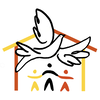
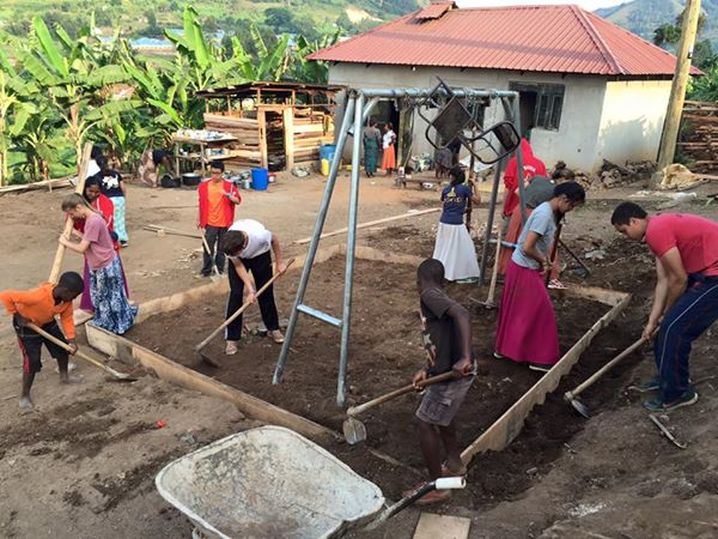
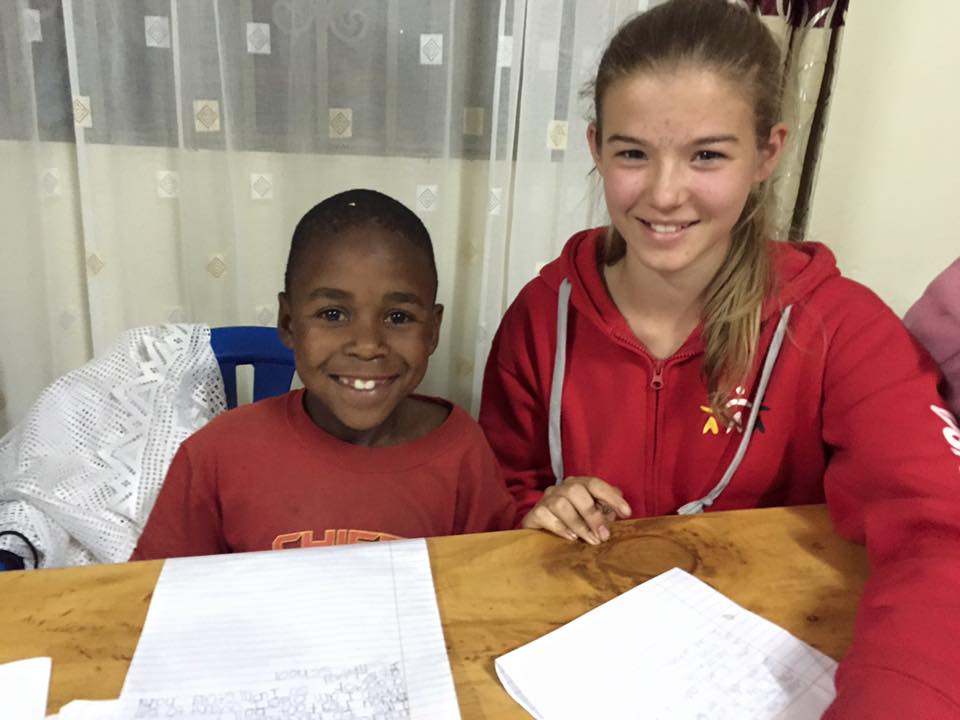
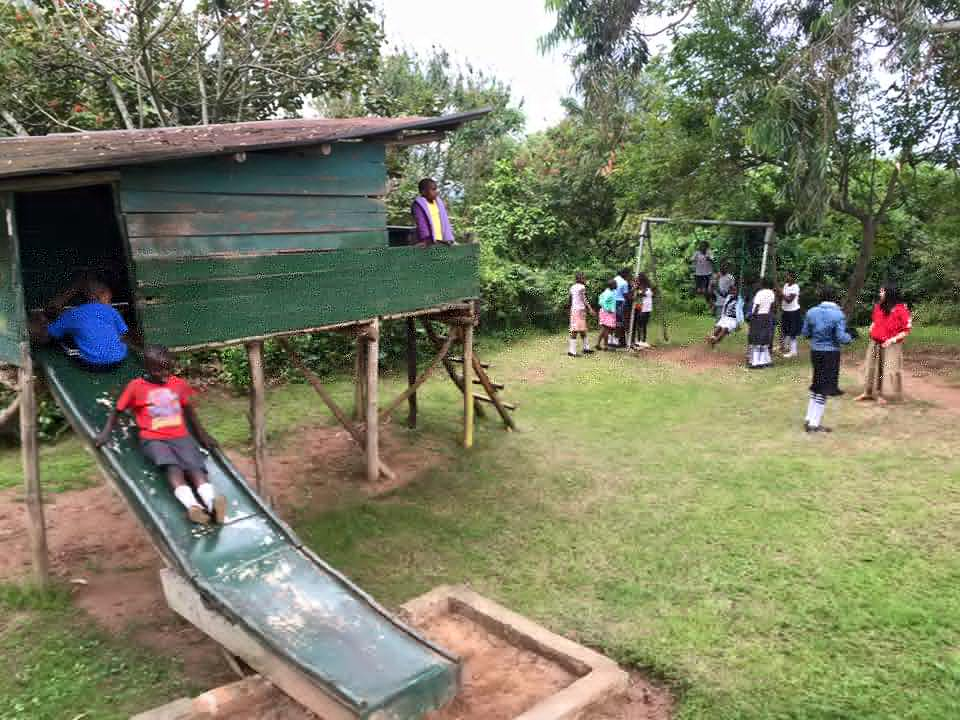
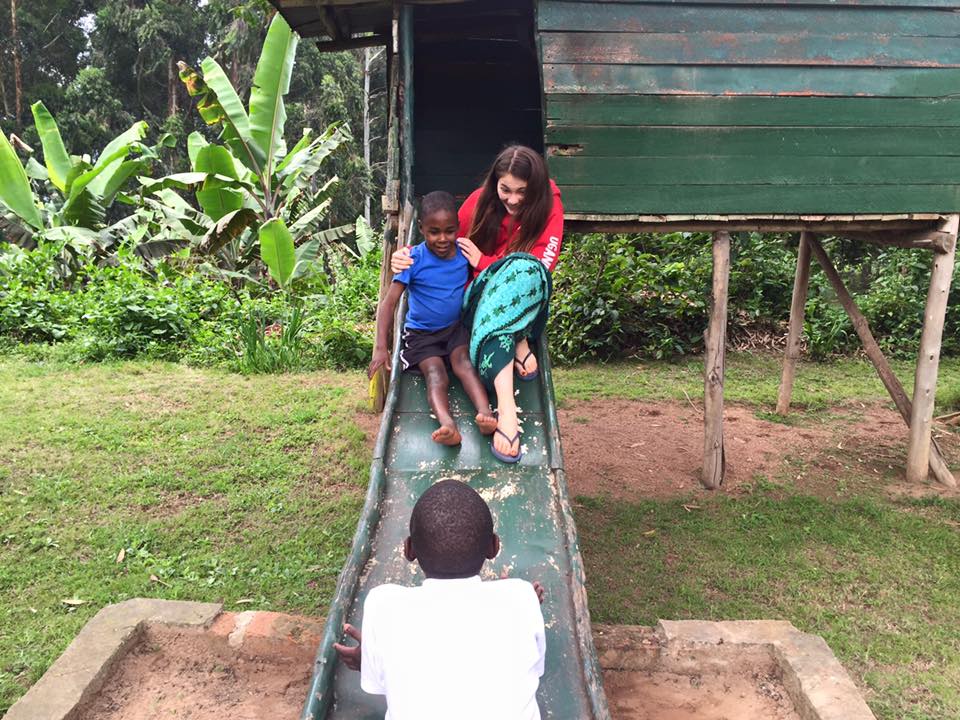
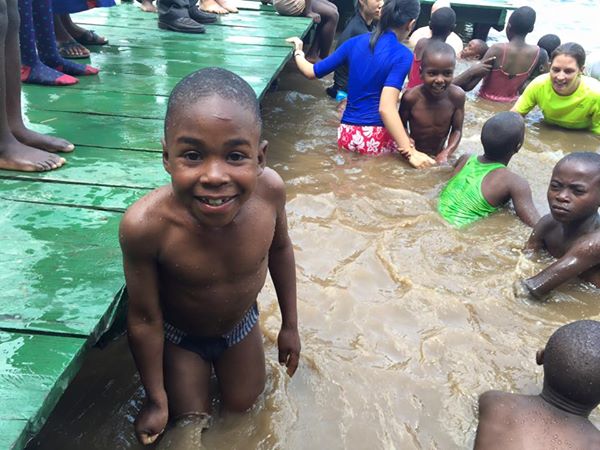
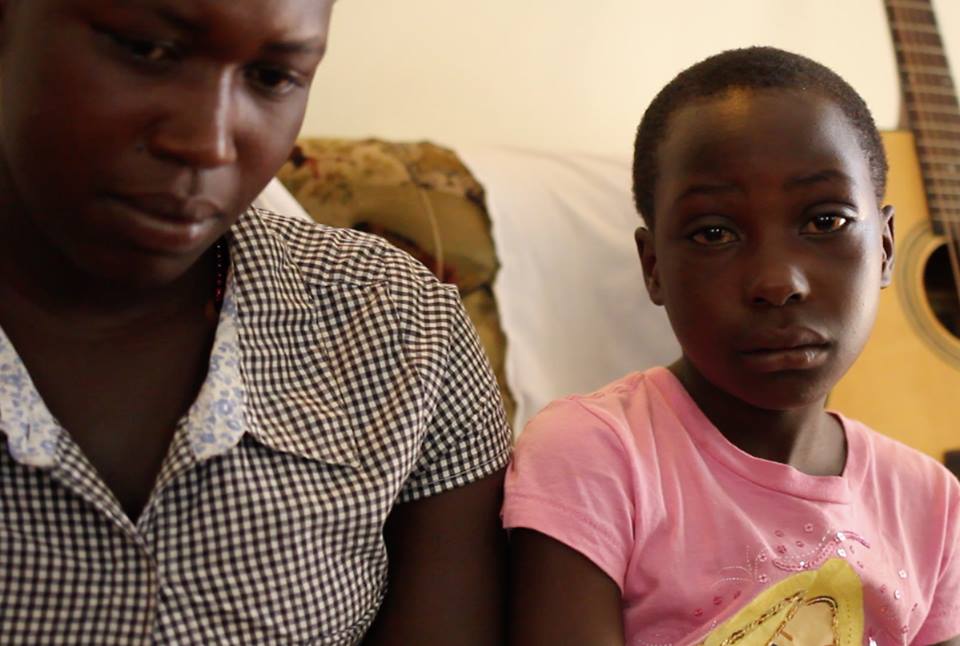
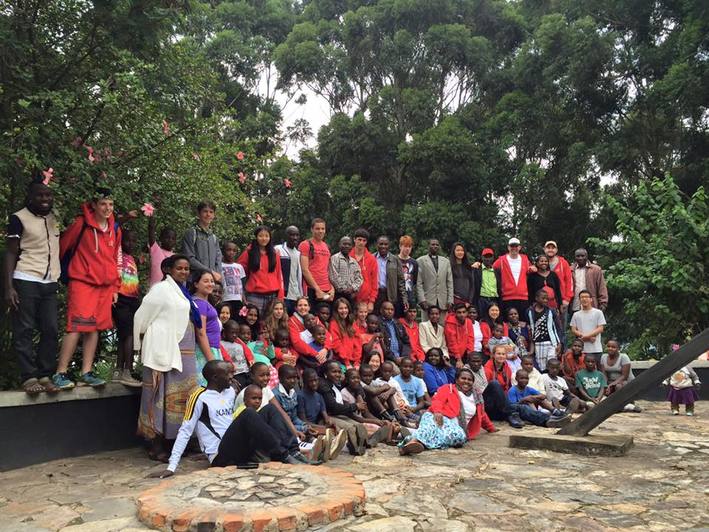
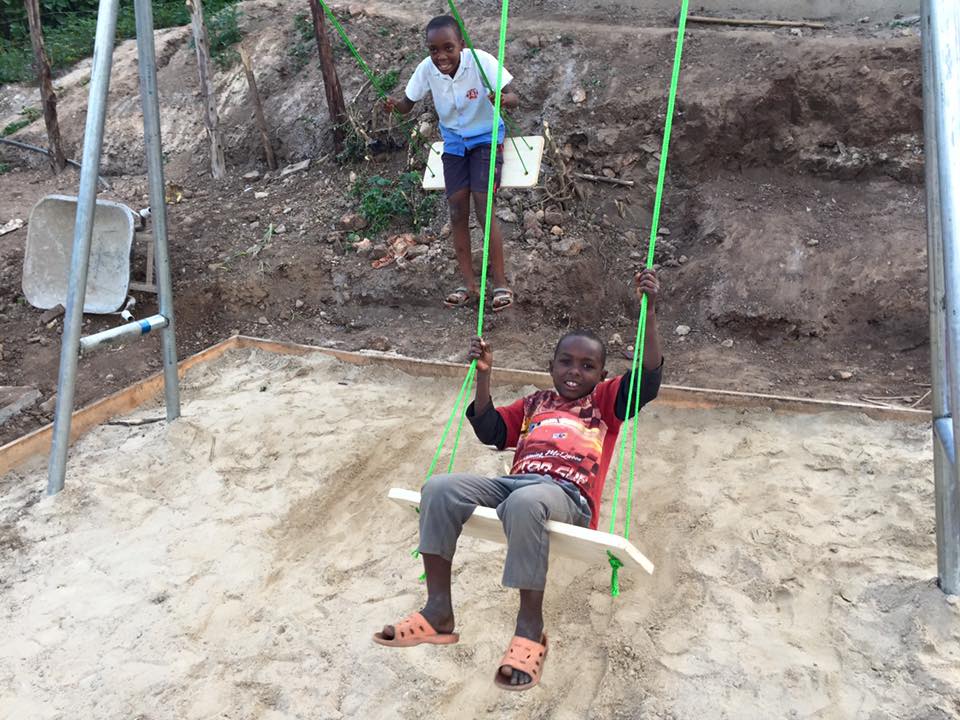
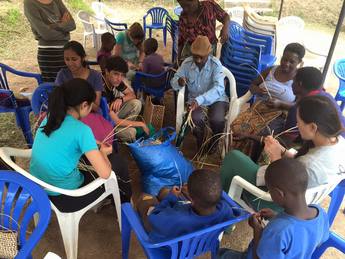
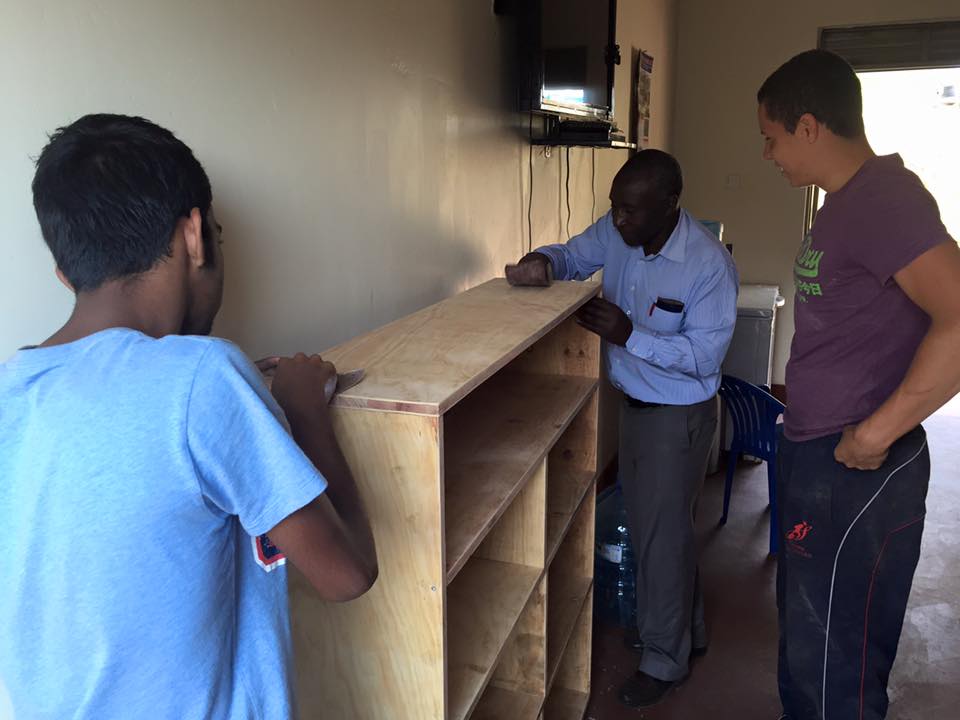

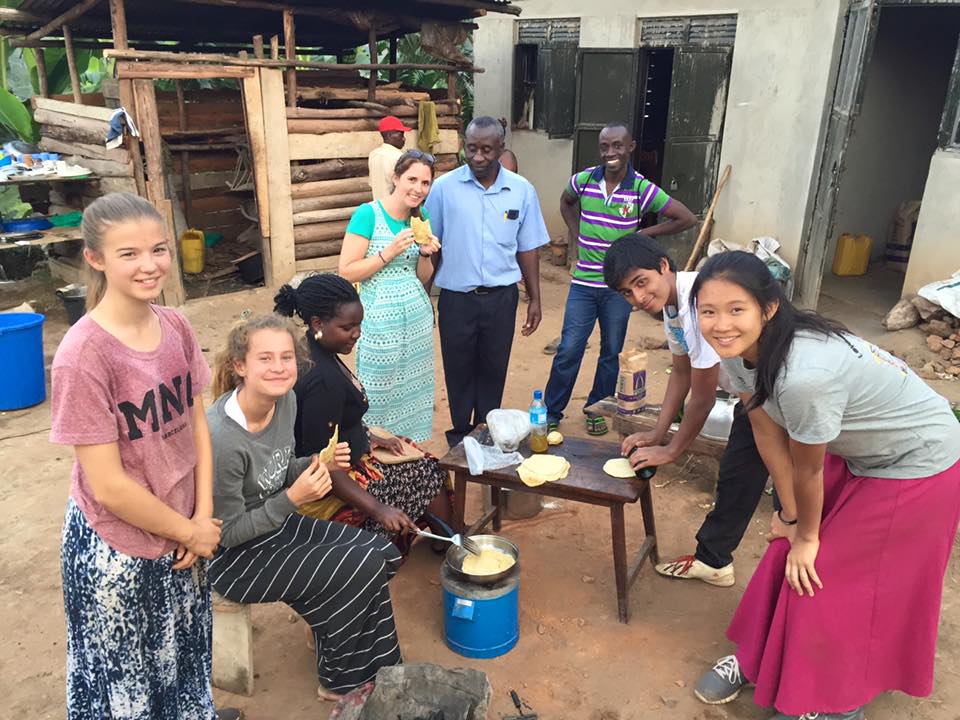
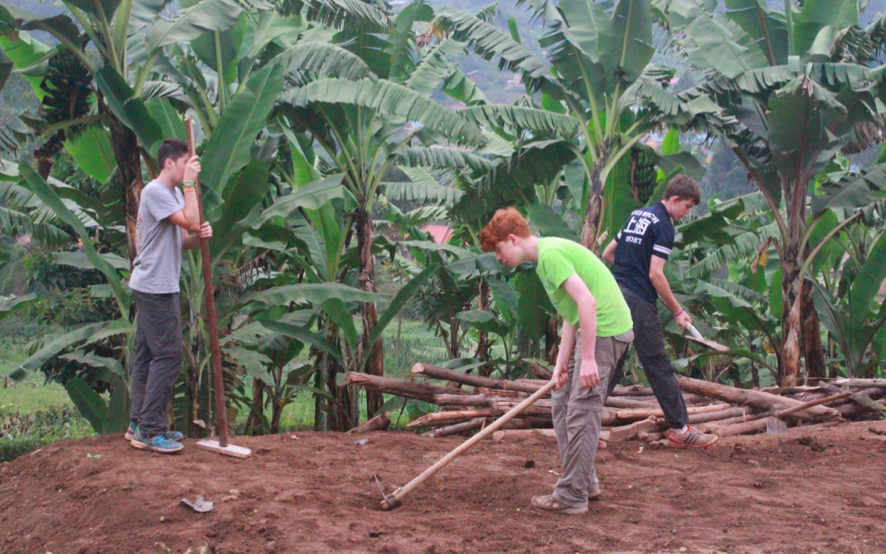
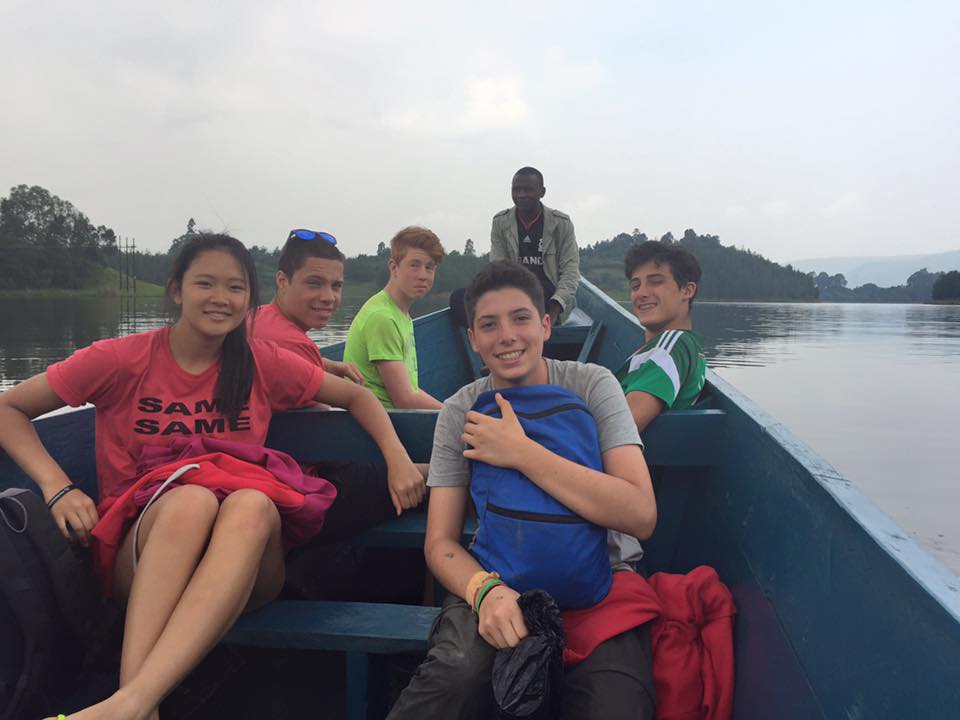
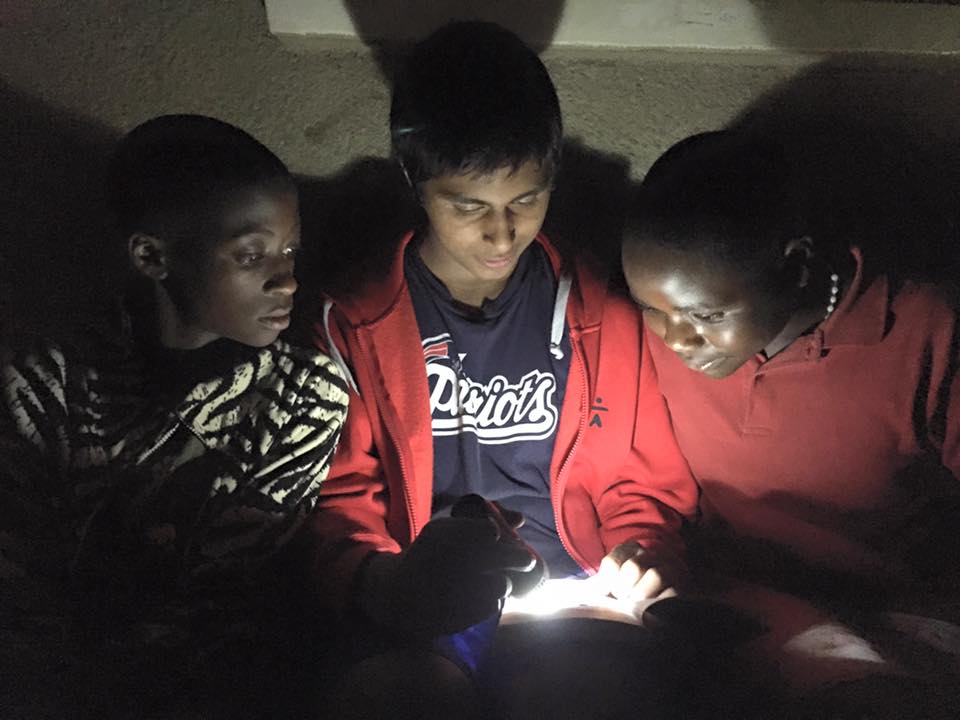
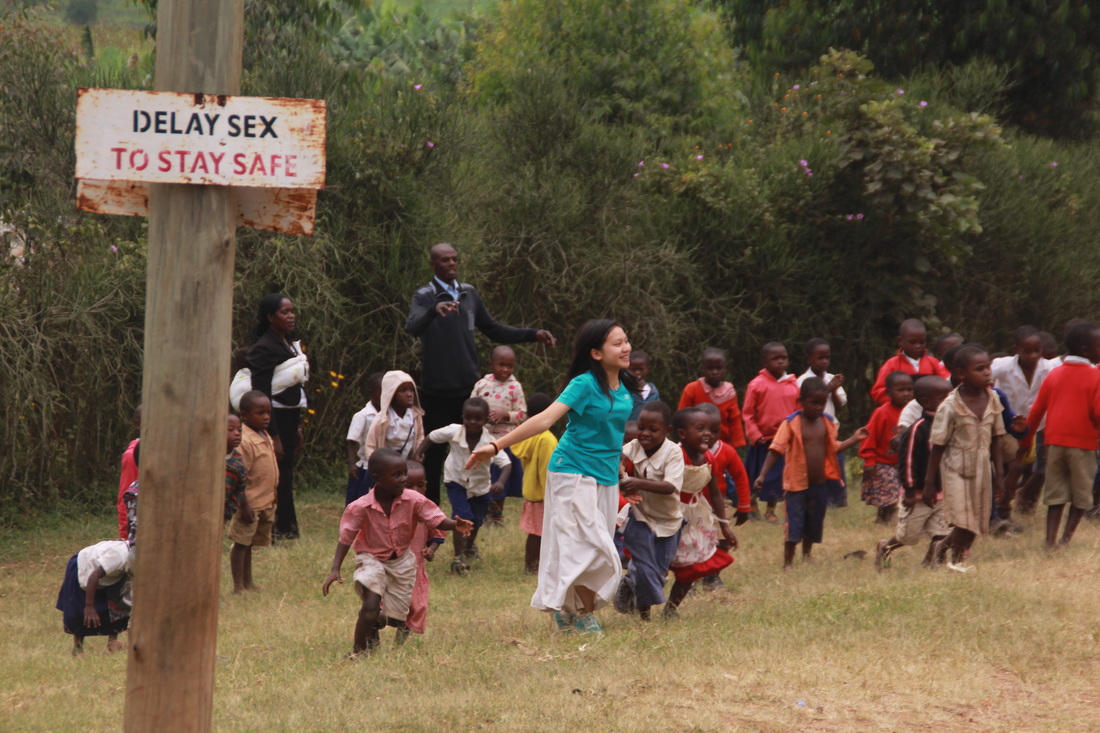
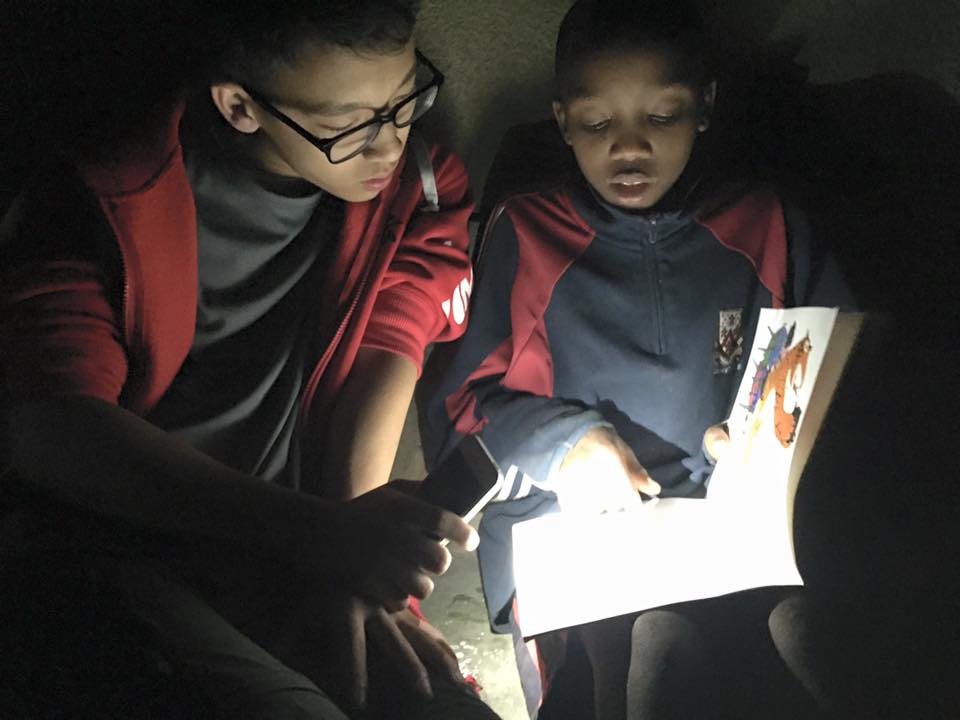
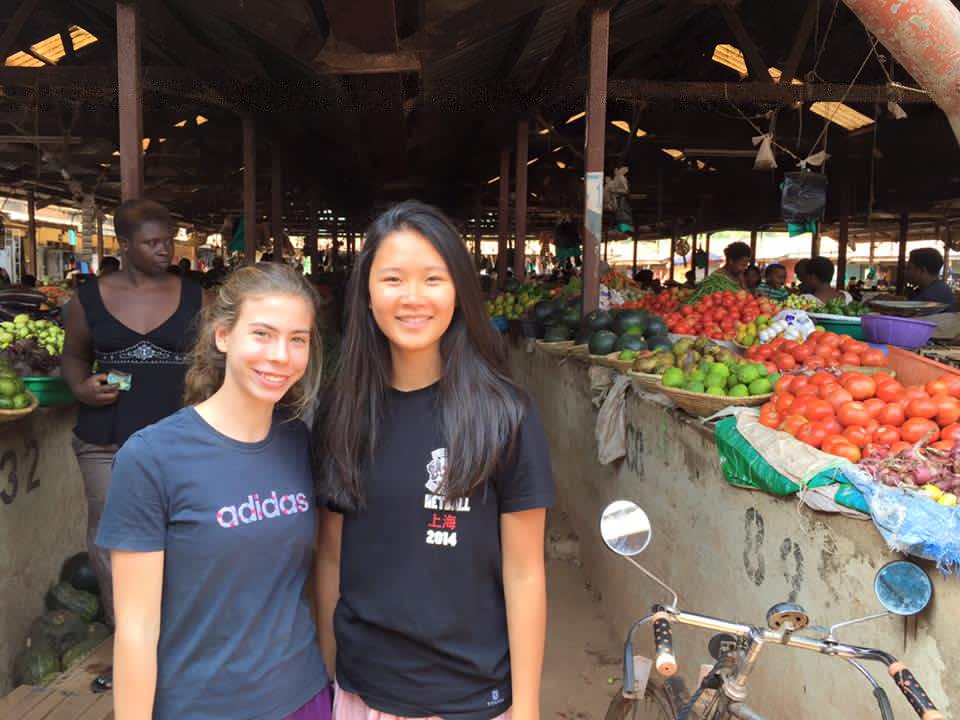
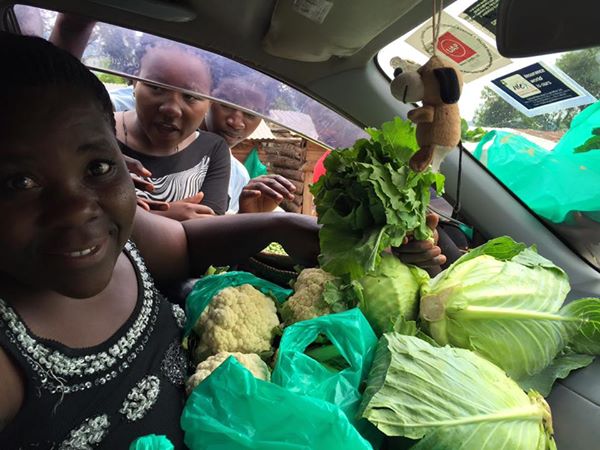
 RSS Feed
RSS Feed

